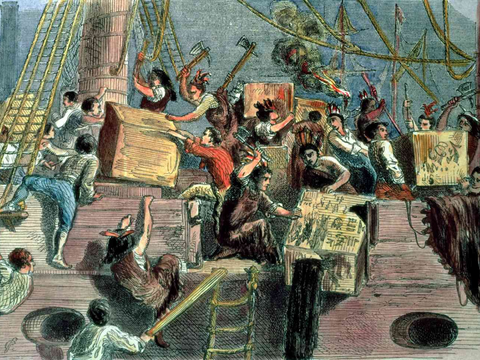The Prelude
In the late 18th century, the American colonies seethed under British rule, primarily due to unjust taxation policies that had burdened them for years. The Tea Act of 1773, which granted the British East India Company a tea trade monopoly in the colonies, was the tipping point. The colonists' frustration over taxation without representation, symbolised by this act, boiled over. It was a clear violation of their rights and ignited a powder keg of anger. The culmination of these grievances would soon lead to the Boston Tea Party, marking the start of a revolution that would ultimately bring about the birth of a new nation.

(Source: https://rb.gy/wvk2e)
The Unfurling of Rebellion
It was the evening of December 16, 1773, when a group of colonists, dressed as Mohawk Indians to conceal their identities, boarded three British ships docked in Boston Harbor - The Dartmouth, The Eleanor, and The Beaver. Onboard, they found chests filled with precious tea, the source of their discontent. In an audacious act of defiance, they proceeded to dump 342 chests of fine tea, worth thousands of pounds sterling, into the harbour.
The Boston Tea Party, as this historic act came to be known, was a powerful symbol of protest against unjust taxation without representation. The colonists, in their pursuit of liberty, had made their point loud and clear: They were willing to sacrifice luxury for the sake of their principles.

(Source: https://rb.gy/tvsi0 )
Tea and Revolution
The Boston Tea Party marked a turning point in the American Revolution. It galvanised the colonists, unified them against British oppression, and fuelled the flames of rebellion. The resolve exhibited on that fateful night would ultimately lead to the American Declaration of Independence in 1776 and the birth of a new nation.
Today, we may sip our teas in the comfort of our homes, but it's important to remember the sacrifices made by those who came before us. Just as the colonists chose to stand up for their beliefs, we too can appreciate the finer things in life while never forgetting the importance of principles and values.




Comments (0)
There are no comments for this article. Be the first one to leave a message!